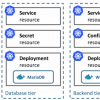containers
 |
Explaining Hardware Virtualization and Containerization Virtualization is the abstraction of a computer resource—such as hardware, memory, storage, an operating system, a desktop machine, or a network—built on top of the physical resource. There are many types of virtualization, and here, we look at virtualization of hardware and of an operating system, or containerization. |
|
 |
Using Kubernetes Helm Charts for Increased DevOps Collaboration A Docker image is usually designed for a baseline functionality and can then be customized. However, customized resource definitions are typically not shared among other users who might have a similar application requirement. Here’s where Helm charts for Kubernetes can help reduce rework and increase collaboration. |
|
|
|
Why Use Kubernetes for Your Container Management? Kubernetes is the most commonly used open source orchestration framework for containers. It’s used for automating deployment, scaling, and management of application containers and works with many container tools, including Docker. But what makes Kubernetes so popular? And would it be useful to you? Let's take a look. |
|
 |
Leveraging Kubernetes as a Tester Kubernetes is a scalable, production-grade container orchestration tool with automated deployment, scaling, and management capabilities. Using it shortens the feedback loop and enhances communication. Here’s how testers can leverage Kubernetes to quickly gauge application quality and speed up the delivery of value. |
|
 |
Demystifying DevOps: A Day in the Life of a DevOps Tester The idea of working as a test specialist on a team using DevOps can be intimidating. There are at least two technology stacks, containerization and continuous integration, that you need to be familiar with. But few people need to be able to start from scratch. Here's what a normal day of testing in DevOps looks like. |
|
 |
Performance Testing for Our Modern, DevOps World As DevOps-based methodologies are more broadly adopted, we'll increasingly move to a continuous testing model. Containerized environments and microservices make it easier to optimize your application by validating changes to the environment or system configuration, allowing you to deliver better products faster. |
|
 |
Virtualization—A Tester's Dream? For testers, virtual machines can be a game changer. To what degree the game really changes depends largely on how an organization decides to work with virtual machines and how active the testers themselves are in recognizing and leveraging virtual machines’ possibilities. |
|
 |
Container-Based Deployments and the Future of IT Operations Container-based deployments have become the preferred approach for managing the build and release of complex applications. Many of the tasks handled by IT operations today may not be necessary in the world of containers. Will Ops continue in its current role, or will it need to evolve with the new challenges? |






